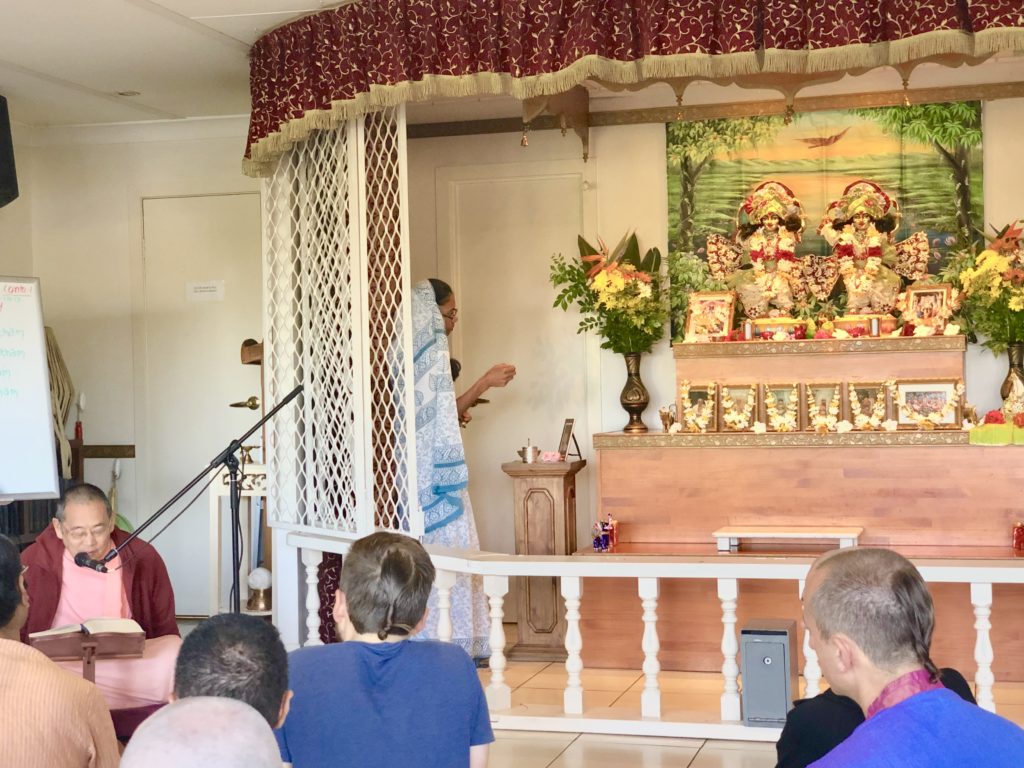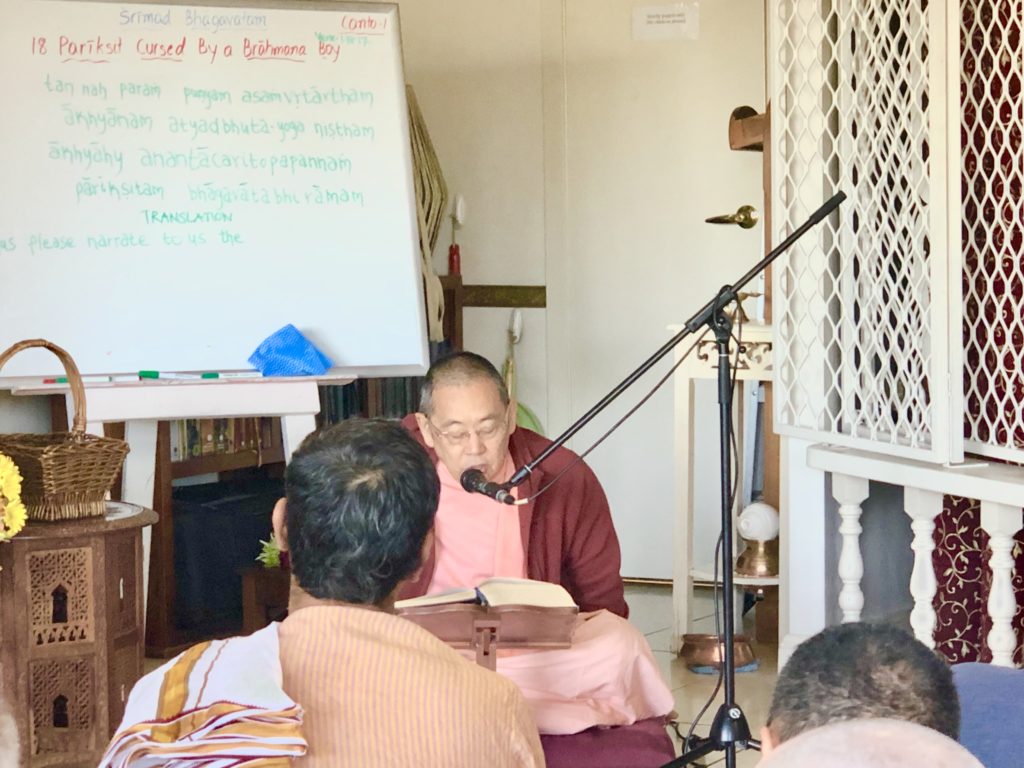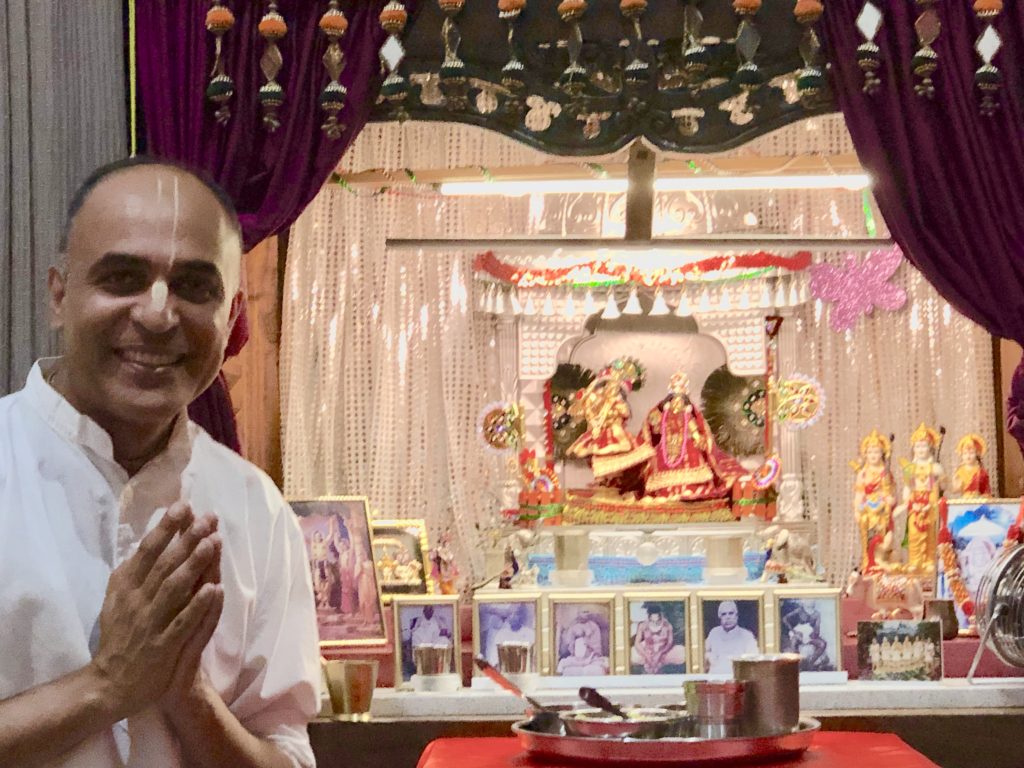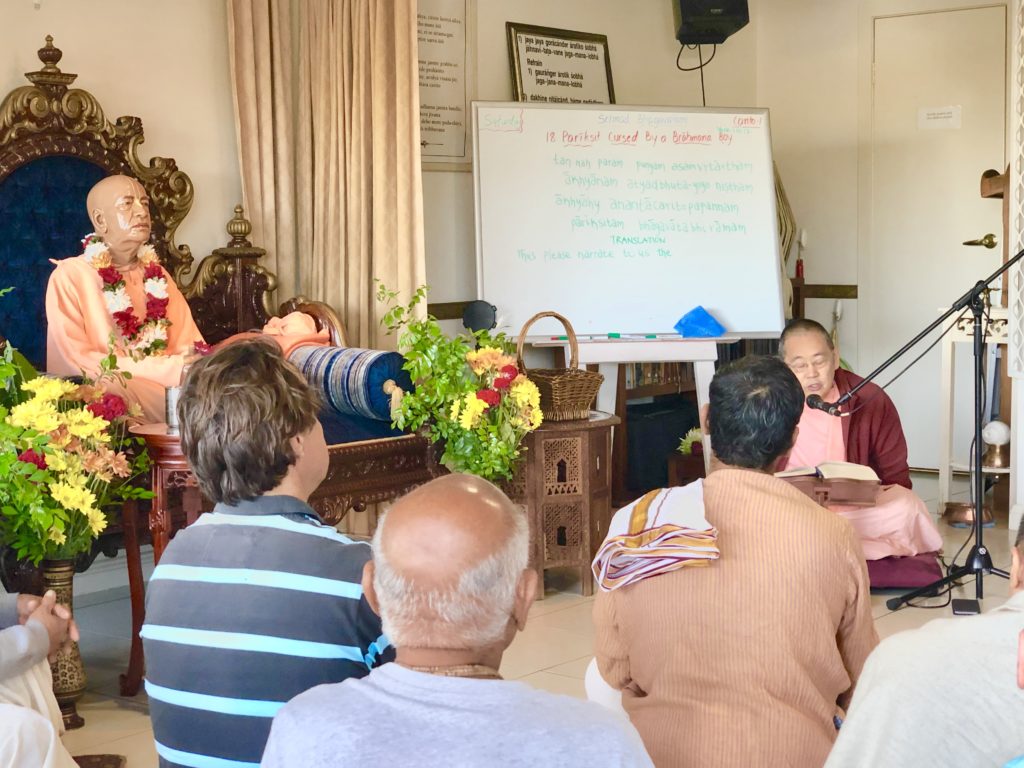Answer Podcast
The post Why did Vidura not instruct Dhritrashtra to apologize to the Pandavas and to thereby become offense-free for practicing bhakti? appeared first on The Spiritual Scientist.
Websites from the ISKCON Universe
Answer Podcast
The post Why did Vidura not instruct Dhritrashtra to apologize to the Pandavas and to thereby become offense-free for practicing bhakti? appeared first on The Spiritual Scientist.


While I was in Brisbane recently, I caught up with my old friend and god-brother, Bhanu Maharaja, who was on a tour of Australia and New Zealand.
Maharaja gives wonderful classes and I enjoy listening to his scholarly presentation of Krsna Conscious philosophy. I had the opportunity to have lunch with him at Madhavi Prabhu’s house, where he was staying.
On another evening, I was invited to dinner with Viraja Krsna Prabhu and family, who were originally from Fiji. Needless to say, the prasadam was fantastic.


 The London College of Vedic Studies serves as the educational department of ISKCON-London, offering a wide range of educational, spiritual and practical courses, seminars and workshops aimed at developing character, personal fulfillment and spiritual progression.
The London College of Vedic Studies serves as the educational department of ISKCON-London, offering a wide range of educational, spiritual and practical courses, seminars and workshops aimed at developing character, personal fulfillment and spiritual progression. 
Your Only Chance!
HH Sacinandana Swami: There is a reason why we are here in this world and why we often feel bewildered and afraid. It is because we have turned away from Krsna. Srila Jiva Gosvami gives an analogy: in Indian villages people used to gather in the evening and sometimes an entertainer would stand before a lantern and use his hands to project shadows on a wall while telling a story. Sometimes children and simple villagers would then become afraid because of seeing demons and witches on the wall.

New Facility For The Youngest Gurukula Students in New Govardhan Farm, Australia.
Syamala Gopa Kishori Dasi: The gurukula pres...

New rescued cows in New Govardhana, Australia (Album of photos)
Anasuya dasi: With great excitement, the goshalla team announces the recent arrival of four cows and a calf, all rescued from a drought- stricken farm. The cows, which would have been slaughtered if not for Maha Mantra dasa’s intervention, are settling well into New Govardhana farm life under the care of the goshalla team. Maha Mantra, Mani Bhanda dasa, Malcolm, Tom and Mandali Kishori dasi are the new cows’ main caregivers. “Whatever cow we get, we know that it is on the farm for life”, Maha Mantra assures, and the new cows seem to know it, happily giving milk for the Deities soon after their arrival.
The rescued cows have been lovingly named Hamsi, Mangala, Mani Kastani, Vamsi priya and the baby calf, Virabhadra. It is our great fortune that two cows are already confirmed to be pregnant, along with Syamalika from the main herd. So we can expect only more good news from the goshalla team in the future!
Find them here: https://is.gd/1rOdh8

Ekadasi chapatis (Album of photos)
Making ekadasi-friendly amaranth/rajgira chapatis: a pictorial journey with full descriptions (Album of photos)


(Kadamba Kanana Swami, 04 August 2018, Vrindavan, India, Bhagavad-gita 4.9)
When Madhavendra Puri was roaming the planet he never met anyone who had the same depth of love for Krsna that he had. It is amazing that the love of God which later was taught by Sri Caitanya Mahaprabhu had already manifested two generations earlier in Madhavendra Puri. Madhavendra Puri was anticipating the sankirtana movement of Sri Caitanya Mahaprabhu and experiencing the greatest ecstasy.
Madhavendra Puri met many people (so it is described in the Caitanya-bhagavata) who were very pious, who were strictly following the injunctions of the scripture, who were religiously going to temples and always worshipping. In that sense we would have said, “Oh they are very good devotees. They are very serious and very dedicated devotees.” From our perspective we would put them way up there. But from Madhavendra Puri’s perspective it was always falling short of love. We also are experiencing that in our spiritual lives.
The article " Falling short of love " was published on KKSBlog.
ISKCON Toronto's Sankirtan Team (TST) is offering a unique Training Seminar, titled 'Watering the Seed' on how to make YOUR follow up easier and effective!
You may be an expert at personal follow ups OR you may be completely new to this concept - this seminar is for YOU!
The seminar is open to ALL departments in the temple, and will provide everyone with the essential tools and strategies on how to effectively connect and stay in touch with those fortunate souls ready to take their first step towards Krishna.
The training will touch on the following topics, to name a few:
- The ‘Noble Necessary Need’
- Breaking the myths of follow ups
- Follow up guidelines and tips
- Planting the seed, watering the seed
- Overview of various temple programs to plug new comers into
- and lot more!
——————————————————Date: Sunday, April 21st 2019Time: 3:00 to 4:00 pmVenue: Green Room @ ISKCON Toronto——————————————————

ALL-INDIA PADAYATRIS ATTEND PRAYAGRAJ KUMBHA-MELA
April 3, 2019
By Pralhad Vatsal dasa, Bhadra Balaram dasa and Prasanna Shyam dasa

Bullock Cart Seva! (3 min. video)
Bullock cart ride is always a welcome service in Mayapur! Pilgrims relish taking a ride in b...

Harinam Sankirtan at Bali (8 min. video)
Srila Prabhupada: Chanting the holy name is the chief means of attaining love of God...
Answer Podcast
The post Is heaven attained by any warrior who fights a war in obedience to authority and dies? appeared first on The Spiritual Scientist.









——————————————————————
Ratha-yatra Address (Right-click to download)

Some seriously good news from Vrindavan!
A pilgrim’s delight! The new bathrooms at Krishna Balarama Mandir. No joke, used by sometimes over a thousand a day, and there are soap dispensers, with soap! Walls and floors in slip-proof (etched) granite.

Jogendra Chandra Das - One of The Last Living Disciple of Bhaktisiddhanta Sarasvati Thakur (the Spiritual Master of Srila Prabhupada) in Cuttack (Album of photos)

Do Vaisnavas drink Tulasi Tea?. In 1975 Srila Prabhupada visited Govinda’s restaurant in Honolulu, Hawaii. I think it was the first Govinda’s in Iskcon, although at it’s second location in the University area.
Bullock cart ride is always a welcome service in Mayapur! Pilgrims relish taking a ride in bullock cart -as we see guests are always busy taking selfies and pictures with bullock cart. During Gaura Purnima, a new bullock cart seva is inaugurated by HH Loknath Swami, when Maharaj drove the cart pesonally. See in this […]
The post Bullock Cart Seva! appeared first on Mayapur.com.
 “If you buy a plane ticket from Dallas to New York in a way it is your destiny to go to New York. But you still have free will to decide how you use your time on the airplane and once you arrive. Our destiny may carry us in a certain direction to a certain place but we still have free will how to engage ourselves on the way and when we reach there. We should use our free will in the best way which is to revive our relationship with God — with Krishna. So, whatever we are doing, wherever we are, we can be in God consciousness — Krishna consciousness.”
“If you buy a plane ticket from Dallas to New York in a way it is your destiny to go to New York. But you still have free will to decide how you use your time on the airplane and once you arrive. Our destiny may carry us in a certain direction to a certain place but we still have free will how to engage ourselves on the way and when we reach there. We should use our free will in the best way which is to revive our relationship with God — with Krishna. So, whatever we are doing, wherever we are, we can be in God consciousness — Krishna consciousness.”
———————————————————————————————————————————



 ——————-
——————-
Ratha-yatra address (Right-click to download)
Ratha-yatra – Ask a Monk (Right-click to download)
Answer Podcast
The post What is the destination of those who obey their authorities and fight in unfair wars such as Vietnam – will their obedience elevate them to heaven? appeared first on The Spiritual Scientist.

Three most important rules for chanting Hare Krishna.
HH Sacinandana Swami: Our spiritual practice should nourish us, it should supply us with a taste that is better than the taste that material activities and sense gratification provide us with. When our spiritual practice lacks this taste, the temptation of material life which then allures us with a seemingly greater taste is always close to us. And at that time we are in danger. However, if we can find taste in our spiritual practice we are safe on the spiritual platform.

Two Foundations of a Guru-Disciple Relationship.
There are two elements that have to come together for a healthy and responsible relationship between guru and disciple. The first element is that the disciple needs to be free of the motive to improve him- or herself materially by this relationship. The second element is spiritual good fortune.

Tulsi at gurupuja in Iskcon LA yesterday.
Srila Prabhupada: Depend on Krishna, because after all, He is the ultimate Master of...

(Kadamba Kanana Swami, 14 March 2019, Durban, South Africa, Lotus Park Nama Hatta)
The waves hitting the Jaladuta were overwhelmingly powerful, and as Prabhupada was rocked about on the Atlantic ocean by the intense waves and wind, he was becoming very ill. Prabhupada had a heart attack. Then he prayed to Krsna , and he saw Krsna.
Krsna was rowing the boat and said, “Do not worry, everything will be fine.”
Then the ocean became very calm, very peaceful. Later the captain said, “Swamiji, you must come with us again, because never before did we have such a peaceful crossing over the Atlantic. Please come back with us.”
While Prabhupada was on the ship, he was reading Caitanya Caritamrta, and he was saying that that was his only solace. He was turning to Krsna and to sastra. So the transcendental devotee simply turns to sastra and finds Krsna in sastra. That is always there. At any moment, one can turn to sastra and just find Krsna there.
But then Krsna will also reveal Himself to the devotee. In this way, the pure devotee always sees Krsna, sometimes through the sastra, sometimes through the holy name, sometimes through kirtan, and sometimes Krsna reveals Himself directly. But all is equal and all is inspiring and all is satisfying to the heart. Whether we read about Krsna , whether we chant the holy name of Krsna in japa or in kirtan, or whether we speak about Krsna, it is all nourishing.
When you are at sea and have that experience of constant movement, even when you are on land you feel like the ground is moving. In the same way, a transcendental boatman, even when he comes into the world of maya, is still experiencing the ecstasy of being at sea. He carries everything with him from that ocean of nectar.
The article " The transcendental boatman " was published on KKSBlog.

Curing insanity of human life by HG Vaisesika Prabhu.

Rathayatra in Johannesburg (Album of photos)
Srila Prabhupada: Worship of the Lord, whose name is like the sun, for just as a ...

Giriraj Swami: April Fools’ Day is celebrated yearly on April 1, and today I thought of Srila Prabhupada’s instruction that we remain fools before the spiritual master.

Yamuna Boat Festival (2019) (Album of photos)
Deena Bandhu Das: On 30th March, we did the Yamuna Boat Festival in Vrindavan. A...
 By Kelsey Watlington
By Kelsey Watlington On Saturday March 23, 2019, ISKCON of Richmond received an inspiring visit from National Convenor for National Ganga Mission, Dr. Snehal Donde, who gave a talk entitled “The Agony of Rivers”. Dr. Donde is the research officer at Bhaktivedanta Vidyapeeth Research Centre in Govardhan Eco Village in Mumbai. She works closely with His Holiness Radhanath Swami and His Grace Gauranga prabhu to advise in water conservation practices in the center. Dr. Donde has more than twenty-four years of experience in the fields of education, research, and administration. She holds two PhDs in the fields of Zoology and Management Studies, and is a senior associate of Rajendra Singh, a well-known water conservationist and recipient of the Stockholm Water Prize. Continue reading "Vedic Education as the Solution to International Water Crisis: ISKCON of Richmond Receives Special Guest
→ Dandavats"
Answer Podcast
Transcription
Question: Which path of yoga burns our karma to what extent?
Answer:
The word karma itself has multiple meanings. Karma can refer to the actions that we do, karma can refer to the reactions that we get, karma can refer to the system of action-reaction, karma can also refer simply to action (we cannot live without doing some karma). When you are talking about self- purification, liberation, the law, the system of action-reaction will always be there. We are always accountable for our actions. So that doesn’t change for anyone. However, we must consider the actions that we do and the reactions that we get for that.
Bhakti Vinod Thakur says that the prarabdha karma doesn’t change because it is associated with our body. By our past karma, we have got a particular body. If Krishna takes away the prarabdha karma, the whole body will also go away. We will not be able to live at all. That body may have some good or bad karma associated with it, depending on how healthy, sickly, good looking, not so good looking, how intelligent, not so intelligent the body is.
Generally, the prarabdha karma stays with us. If you consider the other processes, the Bhagavatam also uses the word called karmashaya. Karmashaya is the impressions within us which impel us to certain actions. Ashaya for karma are the impressions that impel us towards karma. So, essentially purification is different from regulation. Regulation means I stop doing something wrong. Purification means I stop desiring to do that wrong. The desire itself within me goes away.
Any kind of yoga practice requires certain amount of regulation. Without that we cannot be practicing yoga itself. Some amount of discipline needs to be accepted, like some amount of giving up of anti-spiritual activities or immoral activities will be there. Of course, you can do yoga even when you are doing that karma, but that’s not a proper practice of yoga.
If you consider the verse 4.36-37, Krishna talks about,
yathaidhāṁsi samiddho ’gnir bhasma-sāt kurute ’rjuna
jñānāgniḥ sarva-karmāṇi bhasma-sāt kurute tathā.
There he is talking about how just as a fire burns wood to ashes similarly, knowledge (jnana) will burn all reactions of karma (sarva-karmāṇi).
What that means essentially is that you’ll move towards freedom from karmic reactions. You’ll not be bound by karma. How exactly will this happen and what is this jnana? We have to understand that words have different meanings in different contexts. Jnana is not reserved only to jnana-yoga. Jnana is basically knowledge. And bhakti also requires jnana (sambhanda-jnana, for example, in bhakti). The knowledge of our relationship with Krishna. The jnana Krishna has talked about earlier in the previous verse 4.35 he says that knowledge is
yaj jñātvā na punar moham evaṁ yāsyasi pāṇḍava
yena bhūtāny aśeṣāṇi drakṣyasy ātmany atho mayi.
If you get this knowledge Arjuna, then you will not fall into illusion again and you will see all living beings as spiritual and as in Me, as Mine. So, this is not just the jnana from karma or the jnana even from jnana-yoga. It is more of a bhakti jnana where we see Krishna very clearly uses word “mayi” i.e. “in Me”. He is talking about how we are situated in Him. That is devotional knowledge.
In that sense, what Krishna is telling in 4.36 is not different from what he’s saying in 18.66, but that also is talking about bhakti only.
sarva-dharmān parityajya mām ekaṁ śaraṇaṁ vraja
ahaṁ tvāṁ sarva-pāpebhyo mokṣayiṣyāmi mā śucaḥ.
Specifically in 18.66, Krishna is saying that, Arjuna, if you think in fighting this war, there’ll be some sinful activity. Have sinful actions, you may have to do it. Whatever reactions may come, I will protect you from them. So that is universal as well as specific declaration.
In general Krishna says that
pārtha naiveha nāmutra vināśas tasya vidyate
na hi kalyāṇa-kṛt kaścid durgatiṁ tāta gacchati
In 6.40 he says that anybody who is engaged in auspicious work will not meet with destruction
-(na hi kalyāṇa-kṛt kaścid).
One who does good will never perish. Kalyana-krt, auspicious work. Prabhupada explained in the purport and Advaita Acharya also explained that any striving for transcendence is auspicious.
Whether it is through jnana-yoga, ashtanga-yoga, or through bhakti-yoga, it is auspicious. That stays with us from lifetime to lifetime. We say that our material assets will lose at the time of death, but our spiritual assets will stay with us. So spiritual assets can be our attraction towards Krishna, which is the highest spiritual asset, but it can also be the attraction towards transcendence in general, the attraction towards spirituality, the attraction towards doing what is there more in life beyond the mortal material world around us. If somebody has cultivated that, that will always stay with them. All yogas have that imperishable aspect to them. The attraction towards the spiritual that is cultivated will stay always. BG 2.40 (nehābhikrama-nāśo ’sti) also says the same thing. BG 6.40 is an assurance.
Specifically with respect to karma generally Krishna doesn’t intervene unless somebody wants him to intervene. If somebody is not approaching him like in jnana-yoga or ashtanga-yoga, it is not that Krishna abandons them but since they don’t want, so Krishna doesn’t intervene directly. The karmic reaction that come upon them, they may have to transcend by their own spiritual strength. Even in the case of devotees also sometimes, some difficulties may come. Why exactly they come is difficult to say. Usually, the understanding is that Krishna takes a devotee’s karma and then orchestrates in such a way that that is suited for the devotee’s spiritual advancement. Difficulties will come but they’ll help the devotee to grow spiritually.
Generally, Krishna’s intervention, if we consider in terms of either minimizing the karmic reactions or removing them, is something which will get normal through only bhakti. Pain is not necessarily quantifiable. Pain also depends on our attachments. Pain also depends on where our consciousness is invested. If somebody is very attached to their looks and then they get some injury by which their looks get spoiled. That person will be much more devastated than somebody who is not that attached to their looks. That means there is a physical event and there is the impact of that event on us emotionally. By any practice of yoga the emotional impact of that event can be minimized because yoga takes our consciousness to a transcendence.
Every yoga practice can help us to go beyond some amount of karmic reactions. Because the reaction may come, but
kārya-kāraṇa-kartṛtve hetuḥ prakṛtir ucyate
puruṣaḥ sukha-duḥkhānāṁ bhoktṛtve hetur ucyate.
In 13.21 Krishna says that actually it is the cause and effect which happens within material nature, but pleasure and pain are experienced because of the desire to enjoy. Yoga raises above the desire to enjoy gradually. Whatever happens it will not hurt us that much. That can happen by any yoga practice. By bhakti-yoga we can just not turn away from the world, but we can turn towards some supremely attractive object.
The absorption that’s possible is much deeper, much sweeter. Transcendence would be more, but then we have to be sufficiently attracted to Krishna. Sometimes even being a ritualistic devotee, they are not that attracted to Krishna. Somebody might be a very advanced yogi who has turned their consciousness towards spirituality, even if they are not towards Krishna. They might be more transcendental to the body than what we might be. However, in general, Krishna’s intervention is what comes only in bhakti.
End of transcription.
 April Fools’ Day is celebrated yearly on April 1, and today I thought of Srila Prabhupada’s instruction that we remain fools before the spiritual master.
April Fools’ Day is celebrated yearly on April 1, and today I thought of Srila Prabhupada’s instruction that we remain fools before the spiritual master.
In a room conversation in Bombay, on August 16, 1976, a devotee asked Srila Prabhupada whether even a nitya-siddha, a liberated soul, had a guru. “A liberated soul never says that ‘I am liberated,’ Prabhupada replied. “As soon as he says ‘liberated,’ he’s a rascal. A liberated soul will never say that ‘I am liberated.’ That is liberation. Chaitanya Mahaprabhu, He is God—guru more murkha dekhi’ karila sasan [Cc Adi 7.71]: ‘My Guru Maharaja saw Me fool number one, and he has chastised Me.’ He’s God. This is the example. If one remains always a servant, everlastingly, of guru, then he is liberated. And as soon as he thinks that he is liberated, he’s a rascal. That is the teaching of Chaitanya Mahaprabhu. Guru more murkha dekhi’. Chaitanya Mahaprabhu is murkha? Why He’s posing Himself as murkha, ‘I am fool number one’? That means that is liberation. You must be ready always to be chastised by guru. Then he’s liberated. And as soon as he thinks that ‘I am beyond this chastisement. I am liberated,’ he’s a rascal. Why Chaitanya Mahaprabhu says, guru more murkha dekhi’ karila sasan? This is sahajiya-vada, thinking, ‘Oh, I have become liberated. I don’t require any direction of my guru. I’m liberated.’ Then he’s rascal. . . . So better remain a foolish person perpetually to be directed by Guru Maharaja. That is perfection.”
I pray to be directed by Srila Prabhupada eternally, as his everlastingly humble servant.
Hare Krishna.
Your servant,
Giriraj Swami
 Sri Harinaam Das: One of the highlights of this year's festivities in Mayapur during the month of March was the annual program of the Institute for Spiritual Culture. This year the overall theme was "The Glories of Our Mothers", bringing attention to the importance of the seven mothers which Krishna has given us.
Sri Harinaam Das: One of the highlights of this year's festivities in Mayapur during the month of March was the annual program of the Institute for Spiritual Culture. This year the overall theme was "The Glories of Our Mothers", bringing attention to the importance of the seven mothers which Krishna has given us. 
Puja and Yajna at the Mayapur Gurukula (2 min. video)
Every morning before sunrise the students at Bhaktivedanta Academy’s Mayapur gurukula wake up and perform their morning worship.

Srila Prabhupada: “Is your mother beautiful?” (1 min. video)
A little pastime with Srila Prabhupada and his faithful servant Srutakirti prabhu.